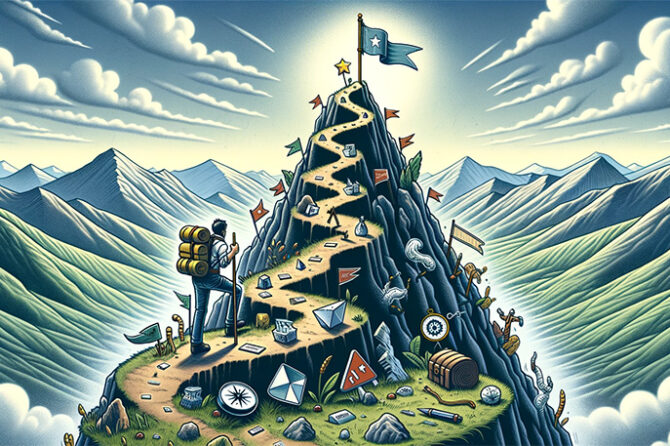
They say entrepreneurship is glamorous. The freedom, the impact, the potential riches – it paints a picture of a life less ordinary. But beneath the glossy façade lies a reality that’s far more demanding than most realize. Entrepreneurship, at its core, is hard. Not because of the tasks you need to accomplish, but because of the person you need to become.
It’s a journey of self-discovery, a relentless pursuit of self-improvement, a constant battle against your own limitations. It’s about confronting your fears, owning your mistakes, and rising above every obstacle that life throws your way.
As a lifelong entrepreneur, or ‘med-preneur,’ my journey has been a blend of failures and successes. Each experience, however, has contributed to fulfilling my life’s objectives. Here’s what I’ve learned from my entrepreneurial path.
- Persisting in the Face of Uncertainty
“The difference between successful people and others is not a lack of strength, not a lack of knowledge, but rather a lack of will.” – Vince Lombardi
Imagine pushing a boulder uphill, day after day, week after week. You see no progress, feel no validation, and exhaustion gnaws at your soul. This is the reality of an entrepreneur who’s yet to see results. The days bleed together, doubt whispers in your ear, and quitting seems like the only rational option.
But it’s in these moments that your true character is revealed. Do you crumble under the pressure, or do you dig deep and find the strength to push forward? Do you succumb to despair, or do you choose to believe that your efforts will eventually bear fruit?
Real life examples:
Dhirubhai Ambani: Despite facing numerous setbacks and challenges, including political opposition and financial difficulties, Ambani persevered with his vision and built Reliance Industries into one of the largest conglomerates in India.
Henry Ford: Despite early setbacks with his automobile prototypes and initial market resistance, Ford persisted with his vision. He eventually revolutionized the automobile industry with the assembly line and mass production, making cars affordable for the average American.
“The only way to do great work is to love what you do. If you haven’t found it yet, keep looking. Don’t settle.” – Steve Jobs
2. Navigating the Sea of Information
“The only true wisdom is in knowing you know nothing.” – Socrates
In the age of information overload, discerning truth from fiction is a constant struggle. Entrepreneurs are bombarded with advice, strategies, and opinions, each promising the key to success. Sorting through this noise and identifying reliable sources becomes a critical skill.
Think of yourself as a captain navigating a treacherous sea. You rely on your instruments, your experience, and your intuition to guide you. But amidst the storms and swirling currents, it’s easy to lose your way. One wrong decision could lead your ship astray, or worse, into the abyss.
Real life examples:
Dr. Verghese Kurien: Recognizing the lack of reliable information and knowledge among farmers, Kurien established Amul, a cooperative dairy organization. By disseminating information through training programs and educational initiatives, he empowered farmers and transformed the dairy industry in India.
Leonardo da Vinci: As a polymath, da Vinci actively sought knowledge from various sources, including classical texts, scientific experiments, and direct observation of nature. This diverse information pool fuelled his creativity and led to ground-breaking discoveries in art, science, and engineering.
“The capacity to learn is a gift; the ability to apply knowledge is a skill; the willingness to share it is a virtue.” – Winston Churchill
3. Embracing the Reality of Not Being Enough
“The best way to predict your future is to create it.” – Peter Drucker.
There’s a painful truth that every entrepreneur must eventually face: you’re not good enough. Not yet. This harsh realization may feel like a blow to your ego, but it’s a necessary step on the path to growth.
Imagine a sculptor staring at a block of marble, envisioning the masterpiece within. They know the tools, they understand the craft, but their skill is still in its infancy. Each stroke of the chisel reveals the imperfections, the flaws that need refining. Only through constant effort and unwavering dedication will the hidden beauty emerge.
Real life examples:
Indra Nooyi: Despite facing initial doubts and challenges as the first female CEO of PepsiCo, Nooyi embraced her limitations and focused on continuous learning and improvement. Her dedication and leadership helped PepsiCo achieve significant growth and global recognition.
Marie Curie: Despite facing sexism and prejudice in the scientific community, Curie persevered and eventually became the first woman to win a Nobel Prize, not once, but twice. Her dedication to her research and willingness to learn from challenges paved the way for women in science.
“The only person you are destined to become is the person you decide to be.” – Ralph Waldo Emerson.
4. The Relentless Pursuit of Improvement
“The only way to do great work is to love what you do. If you haven’t found it yet, keep looking. Don’t settle.” – Steve Jobs.
The journey of entrepreneurship is a never-ending cycle of learning, unlearning, and relearning. It’s about constantly pushing yourself outside your comfort zone, embracing challenges, and seeking opportunities to grow. You must be willing to experiment, fail, and learn from your mistakes.
Think of yourself as a climber scaling a mountain. Each step is a test of your strength, your stamina, and your willpower. The view from the top is breath-taking, but the climb is arduous. Every muscle aches, every breath burns, but you persevere. You know that the summit is worth the struggle.
Real life examples:
A.P.J. Abdul Kalam: Kalam, a renowned scientist and former President of India, was known for his insatiable curiosity and relentless pursuit of knowledge. He constantly pushed himself beyond his comfort zone and embraced new challenges, contributing significantly to India’s space program and missile development.
Nelson Mandela: Mandela spent 27 years imprisoned for his fight against apartheid. He used his time to learn, self-reflect, and develop his leadership skills. This relentless pursuit of self-improvement prepared him to become the first democratically elected president of South Africa and a global symbol of peace and reconciliation.
“The difference between ordinary and extraordinary is that little extra.” – Jimmy Johnson.

5. Defining Your Own Version of “Better”
“Comparison is the thief of joy.” – Theodore Roosevelt.
In a world obsessed with metrics and benchmarks, it’s easy to lose sight of what truly matters. Entrepreneurs often find themselves chasing external validation, comparing their progress to others, and neglecting their own definition of success. It’s crucial to remember that “better” is a subjective term.
Imagine two artists, each with their unique style and vision. One paints vibrant landscapes, capturing the essence of nature’s beauty. The other creates abstract masterpieces, exploring the depths of the human psyche. Both are successful, but their paths are vastly different.
Real life examples:
Ela Bhatt: Instead of pursuing personal wealth, Bhatt dedicated her life to empowering women through SEWA, a self-employed women’s association. Her definition of “better” focused on social and economic upliftment, creating a more equitable and just society for underprivileged women.
Mother Teresa: Instead of pursuing material wealth and personal success, Mother Teresa dedicated her life to serving the poorest and most vulnerable people in Calcutta. Her definition of “better” focused on alleviating suffering and creating a more compassionate world.
“The only person you are destined to become is the person you decide to be.” – Ralph Waldo Emerson.
6. Losing Big and Rising Above
“Fall seven times, stand up eight.” – Japanese Proverb
Failure is an inevitable part of the entrepreneurial journey. There will be times when your ventures fail, your ideas crumble, and your hopes are dashed. It’s in these moments that your true resilience is tested.
Think of a phoenix rising from the ashes. It undergoes a fiery transformation, consuming itself and emerging from the flames reborn. This is the spirit of an entrepreneur who has faced failure and come back stronger, wiser, and more determined than ever before.
Real life examples:
Ratan Tata: After facing criticism and initial setbacks with the launch of Nano, Tata’s most affordable car, he remained committed to his vision of providing affordable transportation to the masses. The Nano became a symbol of innovation and Tata’s resilience in the face of adversity.
Walt Disney: Disney faced numerous rejections and failures before achieving success with Mickey Mouse and his animation empire. Each setback fuelled his determination and helped him refine his craft, eventually leading him to revolutionize the animation industry.
“The comeback is always stronger than the setback.” – Zig Ziglar
7. Facing the Fear and Taking Action
“Courage is not the absence of fear, but the triumph over it. The brave man is not he who does not feel afraid, but he who conquers that fear.” – Nelson Mandela
Entrepreneurship is a lonely road. You’ll face countless challenges, make difficult decisions, and experience moments of profound doubt. The pressure can be immense, the stress overwhelming, and the fear paralyzing.
But in the face of fear, action is the only antidote. Imagine a lone warrior facing a seemingly insurmountable army. They know the odds are stacked against them, but they charge forward nonetheless. Their courage inspires others, their determination fuels their actions, and their bravery becomes a beacon of hope.
Real life examples:
Satyagraha Movement: Mahatma Gandhi led the non-violent civil disobedience movement against British rule in India. Despite facing imprisonment and potential violence, he courageously advocated for freedom and independence, inspiring generations of Indians to fight for their rights.
Rosa Parks: Though afraid of the potential consequences, Parks refused to give up her seat on the bus to a white man, sparking the Montgomery Bus Boycott and a significant turning point in the American Civil Rights Movement.
“The only way to do great work is to love what you do. If you haven’t found it yet, keep looking. Don’t settle.” – Steve Jobs
8. The Power of Self-Reliance
“The only person who can tell you that you can’t do something is you. You have to be your own biggest motivator.” – Unknown
Entrepreneurship is an individual endeavour. You may have mentors, advisors, and supporters, but ultimately, the responsibility for your success or failure rests on your shoulders. You must learn.
Real life examples:
JRD Tata: JRD Tata, the pioneer of Indian aviation, built Tata Group into a diversified conglomerate through his entrepreneurial spirit and self-reliance. He believed in innovation, risk-taking, and fostering a culture of self-sufficiency within the company.
Abraham Lincoln: Lincoln rose from humble beginnings to become President of the United States. He was largely self-educated and relied on his own determination and hard work to overcome numerous obstacles and achieve his goals.
“The only way to do great work is to love what you do. If you haven’t found it yet, keep looking. Don’t settle.” – SteveJobs.
Prof. Dr. Prahlada N. B
12 Dec 2023
Chitradurga.

















Leave a reply